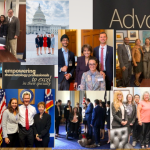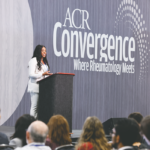For the second year, the ACR’s annual Hill Day advocacy event in Washington, D.C., was held in video conferences rather than conference rooms.
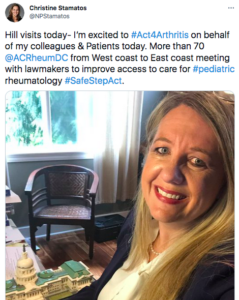 On May 20, ACR volunteer leaders, including members of the Board of Directors and committees, convened more than 100 video meetings with Congressional leaders to advocate on behalf of rheumatology patients and providers. More than 70 ACR representatives shared rheumatology perspectives on the need to reform step therapy and the importance of practitioner loan repayment to alleviate pediatric workforce shortages. Many continued their conversations and shared their experiences on Twitter using the hashtag #Act4Arthritis and tagging the new ACR advocacy handle @ACRheumDC.
On May 20, ACR volunteer leaders, including members of the Board of Directors and committees, convened more than 100 video meetings with Congressional leaders to advocate on behalf of rheumatology patients and providers. More than 70 ACR representatives shared rheumatology perspectives on the need to reform step therapy and the importance of practitioner loan repayment to alleviate pediatric workforce shortages. Many continued their conversations and shared their experiences on Twitter using the hashtag #Act4Arthritis and tagging the new ACR advocacy handle @ACRheumDC.
Advocacy in Action
“I felt so lucky to be in the ‘room where it happens.’ It is amazing to have the opportunity to talk about our specialty with the people that set the agenda for our country,” says Karen Onel, MD, chief of the Division of Pediatric Rheumatology, Hospital for Special Surgery (HSS), and a professor of clinical pediatrics, Weill Cornell Medicine, New York.
“I thank the ACR for the opportunity to discuss a field that I love and feel passionately about with the people with the power to make our needs and those of our patients heard,” Dr. Onel adds. “If you have the opportunity to participate you should grab the opportunity. Advocacy in action!”
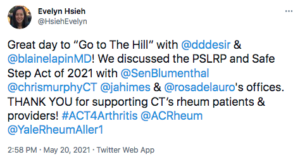 Participants connected with their members of Congress to talk about the importance of passing the Safe Step Act and funding the Pediatric Subspecialty Loan Repayment Program (PSLRP), which was authorized in the CARES Act.
Participants connected with their members of Congress to talk about the importance of passing the Safe Step Act and funding the Pediatric Subspecialty Loan Repayment Program (PSLRP), which was authorized in the CARES Act.
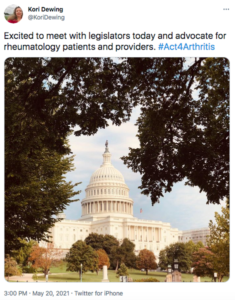 “Although it can seem initially intimidating to be meeting with members of Congress or their staff, my experience has been quite the opposite. I have been welcomed and encouraged to explain my concerns, so that my elected officials have a better understanding of how these issues affect me, their constituent,” says Kori Dewing, DNP, ARNP, Division of Rheumatology, University of Washington, Seattle. “It is really an easy process to participate in these Capitol Hill visits.”
“Although it can seem initially intimidating to be meeting with members of Congress or their staff, my experience has been quite the opposite. I have been welcomed and encouraged to explain my concerns, so that my elected officials have a better understanding of how these issues affect me, their constituent,” says Kori Dewing, DNP, ARNP, Division of Rheumatology, University of Washington, Seattle. “It is really an easy process to participate in these Capitol Hill visits.”
The ACR advocacy and government affairs staff can provide materials and training to give members the needed background and confidence to present effectively, she notes.
“I truly enjoyed the conversations I had with the members and their staff this year. We all suffer from the day-to-day clinic frustrations with patient access. The opportunity to describe how these issues impact our patients to members of Congress—who then not only understand, but have the power to push forward patient-centered legislation—is powerful. We can’t afford to simply sit back and hope change happens. Legislators need to hear that this is a priority for their constituents,” Dr. Dewing says.
Meaningful Conversations
“There was a real sense that the asks this year were feasible. Workforce shortage problems are pretty easy to explain and relate to, and the PSLRP is already authorized, it just needs to be funded. And step therapy reform is popular with state legislatures and already has bipartisan support in both chambers at the federal level,” says Doug White, MD, PhD, Gundersen Health System, Onalaska, Wis. “I had the sense we were there at the right time to help get these two measures over the finish line.”
The virtual format works well for these meetings, Dr. White says. “We’re all aware that Zoom is a disaster for some meetings and fine for others. But I think it may actually work better than running all over the capital for advocacy days. Whether you prefer in-person or virtual meetings, the possibility of virtual meetings in the future will certainly open the door to many more participants.”
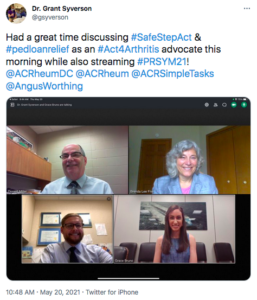 Grant Syverson, MD, a pediatric rheumatologist at Sanford Children’s in Fargo, N.D., found ACR training helpful for the virtual fly-in. “The Advocacy Leadership Conference reinforced the importance of being engaged in public policy. Learning about advocacy and being able to actually implement that information in real time with our elected representatives and their staff is amazing, and I felt like I was able to have my voice heard in a way that was effective and meaningful. I know that the policies we advocated for will change the lives of many patients and their families for the better,” Dr. Syverson says.
Grant Syverson, MD, a pediatric rheumatologist at Sanford Children’s in Fargo, N.D., found ACR training helpful for the virtual fly-in. “The Advocacy Leadership Conference reinforced the importance of being engaged in public policy. Learning about advocacy and being able to actually implement that information in real time with our elected representatives and their staff is amazing, and I felt like I was able to have my voice heard in a way that was effective and meaningful. I know that the policies we advocated for will change the lives of many patients and their families for the better,” Dr. Syverson says.
Altogether, 72 volunteer leaders made 119 connections on both sides of the political aisle, highlighting the importance of bipartisan support for policies that support rheumatology patients and providers.
We thank our #Act4Arthritis attendees for a great Advocacy Leadership Conference! We educated legislators on how the #SafeStepAct and #pedloanrelief can provide quality access to care. Help us share our message with more offices by sending letters today: https://t.co/EZrlgzpWzD pic.twitter.com/ddEOqSGA7S
— ACRheumDC (@ACRheumDC) May 21, 2021
“We had a successful day advocating for our rheumatology patients and for issues affecting rheumatologists and the workforce,” says Amanda Schnell, MD, assistant professor of medicine, University of Alabama at Birmingham. “I believe it is important for rheumatologists to advocate and form connections with our senators and representatives so we can help make positive changes to improve access to quality care for our patients. I am grateful and honored to be able to advocate for my patients—it is inspiring to know that we can make a positive difference. I would encourage any rheumatologist or trainee interested to participate.”
Read more of your colleagues’ experiences on Twitter with the hashtag #Act4Arthritis. You can still add your voice by sending letters to your members of Congress at the Legislative Action Center and ask them to support the Safe Step Act and fund the Pediatric Subspecialty Loan Repayment Program.

